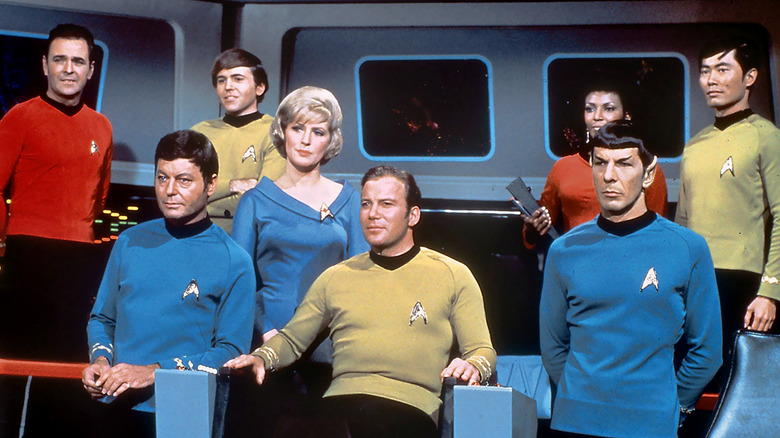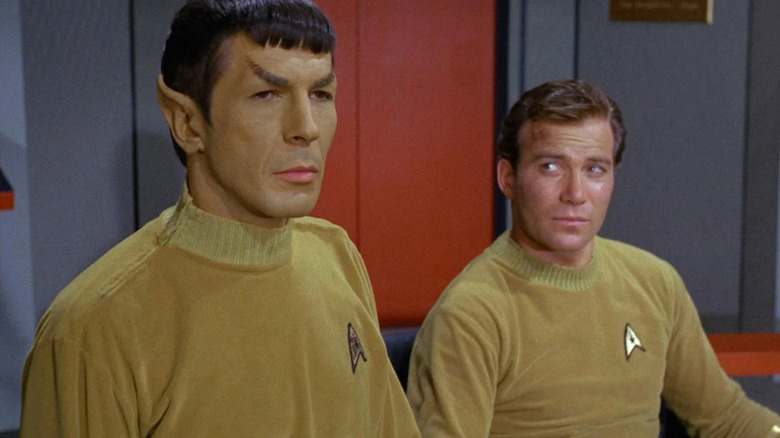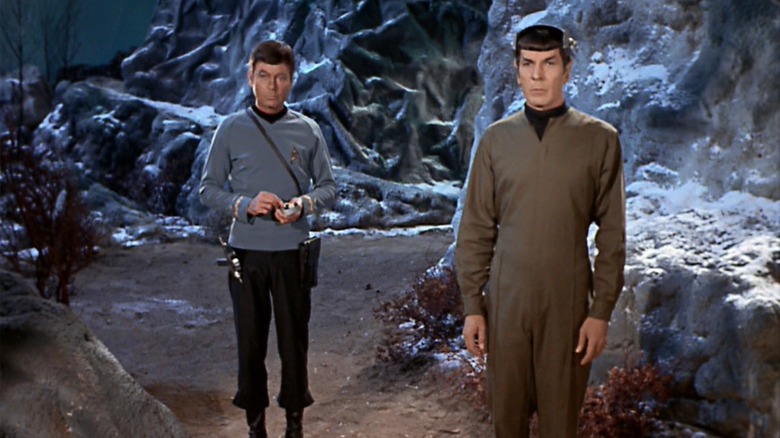How Legendary Sci-Fi Writer Isaac Asimov Felt About Star Trek
It's always interesting to hear what creators think about others in their genres, especially when we're talking about the biggest names in classic science fiction. One example is when the legendary sci-fi author Isaac Asimov was interviewed in footage from the New York City "Star Trek" convention in 1973. Asimov, who wrote the Laws of Robotics (and the Zeroth Law) in context of both "I, Robot" and "Foundation," offered his thoughts on the fellow sci-fi icon. This was after the original series had ended in 1969, and more than a decade before "Star Trek: The Next Generation" began, meaning he was talking about foundational "Star Trek" concepts.
Asmiov talked about the show's famous tagline, "To boldly go where no man has ever gone before." He pointed out that, while the implication is territorial, the show tackled, in his words, "problems that man has not faced." He praised the way "Star Trek" wasn't afraid to deviate from adventure to tackle real social problems.
He also complimented how the show handled their Prime Directive, saying, "It mattered not what form the intelligence took, or what kind of universe the intelligence built for it. If it was intelligent, if it was intelligent enough to build a culture, then it had the right to live in that culture. It had the right to exist and be. And no other culture had a right to interfere with it, as long as it was not endangering cultures beyond itself." That's all a lot more favorable than what Asimov later thought about "Battlestar Galactica."
Star Trek's character development and the rational man
Asimov also had a lot to say about how "Star Trek" handled its characters. He pointed out that the show gave them sanity and meaning in the midst of adventure into the unknown. "It had fully realized characters," he said in '73, adding, "Naturally, Spock springs to mind. The rational, sane man. And there's something very comforting about sanity, especially in a world like ours."
Complimenting the characters of "Star Trek" is interesting, considering that character development is one of Asimov's weaker points. His "Robot" novels have few recurring characters. Even when you do meet someone again, they are often presented and re-presented with minimal backstory. Dr. Susan Calvin is one of these, only popping up in short stories when needed. Elijah Baley is probably the most important recurring character in the "Robot" novels, and he is a flatly troped detective, all things considered.
In the "Foundation" novels, characters see relentless turnover. Some, like the plot-central Golan Trevize, are again predictably written. It's ironic that, in Apple's "Foundation" series, the most compelling characters are individuals like Lou Llobell's Gaal Dornick and Lee Pace's Emperor Cleon, both of whom have a scant presence in Asimov's stories. Hari Seldon (Jared Harris) isn't even a steady focus, though, like the Apple series, his presence lasts even when his body is dead.
Asimov was a world-builder and a concept creator. Character development simply wasn't his strong suit, but he knew to love it when "Star Trek" did it well.
The endurance of science fiction in books versus live action
One of Asimov's more sobering comments on the original "Star Trek" was about its brief run. Here's what the author had to say at that '73 convention: "No matter how successful "Star Trek" was with its viewers, no matter how intensely it pleased its viewers, unfortunately, the medium of television these days depends entirely upon a mass audience."
From there, he went into a diatribe about the realities of the visual art form. "They sell advertising time. That is their business. The program is merely a way of enticing you to watch the advertising. And if there isn't enough of an audience, the advertisers won't come, regardless of how intensely pleased the audience they do get is."
It is an interesting opinion, considering how many of Asimov's writings have found their way to the silver and streaming screens since his death in 1992. Would the sci-fi genius have had the same cynical opinion on television if he'd lived to see modern, non-cable streaming models? What would he think if he could see the total body of "Trek" work these days?
There's still plenty to criticize in how modern visual media works, but it isn't the simple "success or failure in the moment" equation it was in the '70s. It's still interesting to contrast a benchmark in print against a smashing on-screen success, then and now. In hindsight, both clearly work. It is also fun to know that, at the end of the day, Asimov had plenty of respect for "Star Trek," regardless of how he felt about the shortcomings of the TV medium.


